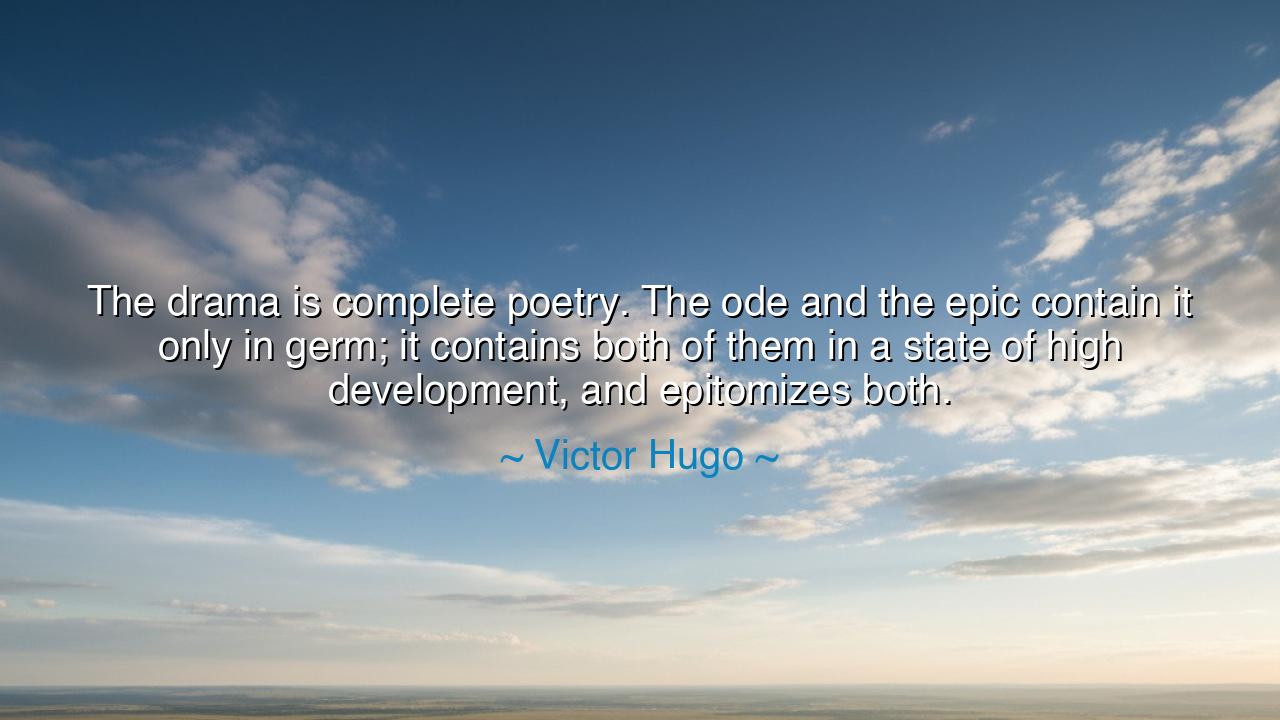
The drama is complete poetry. The ode and the epic contain it
The drama is complete poetry. The ode and the epic contain it only in germ; it contains both of them in a state of high development, and epitomizes both.






Hear the thunderous words of Victor Hugo, titan of literature, who declared: “The drama is complete poetry. The ode and the epic contain it only in germ; it contains both of them in a state of high development, and epitomizes both.” In this saying, Hugo proclaims the supremacy of drama, not as a mere form of art, but as the living flame of poetry in its highest state. He teaches that while the ode and the epic whisper of grandeur in fragments, the drama embodies them both, uniting their essence into a single, breathing, human form.
The meaning of this statement lies in the completeness of drama. The ode, lofty and lyrical, is the hymn of praise, soaring like a song to the gods. The epic, vast and noble, tells of heroes and nations, of war and destiny. Yet both remain partial, incomplete visions. The drama, however, is the great mirror of life: it contains the hymn of the ode, for it can rise into lyrical beauty, and it contains the sweep of the epic, for it can span worlds and generations. But it does more—it distills both into action, into conflict, into human voice and deed. In the drama, poetry ceases to be abstract; it becomes incarnate.
The ancients knew this truth long before Hugo spoke it. In the theaters of Athens, men gathered not only to be entertained but to be transformed. There, Aeschylus, Sophocles, and Euripides forged the highest poetry—not in mere song or tale, but in the clash of wills, in the tragedy of heroes, in the chorus that blended ode and action. Their dramas were not diversions but revelations, embodying both the exaltation of the ode and the grandeur of the epic, yet surpassing them by setting truth upon the stage.
History too bears witness. Consider Shakespeare, the bard of England. In his plays, we find the songlike beauty of odes—think of the lyrical soliloquies of Hamlet or the tender musings of Juliet. At the same time, we behold the vast sweep of the epic—wars in Henry V, kingdoms torn in King Lear, cosmic struggles in Macbeth. Yet all these are not merely told but lived before us, embodied in flesh and voice. Shakespeare proves Hugo’s claim: drama is not fragment but fullness, the summit of poetry.
Why does drama hold this crown? Because it unites poetry with humanity. The ode speaks to the gods; the epic speaks to the memory of nations. But drama speaks to the living heart, to the soul in its struggle, to the man or woman who sits in the darkness of the theater and sees themselves reflected in the light of the stage. Drama is poetry in motion, poetry that breathes, poetry that confronts the audience with the eternal questions of love, death, justice, and fate.
The lesson for us is clear: seek completeness, not fragments. Just as drama unites the soaring spirit of the ode and the vast grandeur of the epic, so too must our lives seek to embody not partial truths, but wholeness. Let us live not in abstractions alone, nor in stories of the past alone, but in the vivid drama of the present moment, where truth is tested and revealed through action. Poetry, like life, is greatest when it is lived.
Therefore, O seeker, heed Hugo’s wisdom: the drama is complete poetry. Read the odes, honor the epics, but know that life itself is drama, and in living truthfully you partake in the highest poetry. Let your days be written not as fragments but as a great play, filled with beauty and conflict, sorrow and triumph, where your soul, like the greatest dramas, becomes both song and story, both ode and epic made flesh.






KHNguyen Khanh Huyen
I really like how Victor Hugo sees drama as a high point of literary form, combining the finest elements of both poetry and the epic. But it also makes me question: is every drama truly poetry in this sense? Can a play that doesn’t delve into deep emotional or poetic territory still be considered a complete form of drama, or is Hugo’s ideal about capturing the essence of all genres within one?
KDhoang kieu duy
Hugo’s description of drama as a fusion of poetry and epic brings a new perspective on the genre. In drama, we often find the lyrical beauty of poetry alongside the sweeping, larger-than-life narratives of epics. I wonder, though, if this makes drama more complex to write or to understand. Does it mean that every drama should contain these elements, or can it be effective even without such a balance?
PPPhanvchong Phan
This quote by Hugo makes me think about the unique qualities of drama in literature. The idea that drama contains both the ode and the epic suggests that it has the ability to convey deep emotional truth while also telling a grand story. But what makes drama so special in this sense? Is it the dialogue, the performance, or the combination of both that makes it the most complete form of expression?
KNKhanh Nguyen
Victor Hugo’s view on drama as complete poetry is fascinating. He suggests that drama, by its very nature, is an evolution of both the ode and the epic, combining the emotional depth of poetry with the grand narratives of the epic. Does this mean that drama, more than any other genre, can reach a perfect balance between emotion and story? Can a truly powerful drama evoke the same depth as both poetry and epic at once?